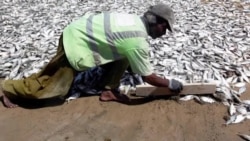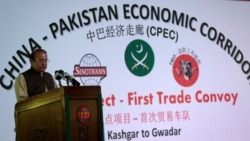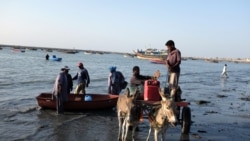On November 30, Chinese Foreign Ministry spokesman Zhao Lijian was asked about protests in the Pakistani port city of Gwadar. The demonstrators are angered by the presence of Chinese trawlers and the impact on local fishermen.
China is building a deep-sea port in Gwadar under a 40-year lease agreement signed in April 2017. The project was dubbed “the jewel in the CPEC [China Pakistan Economic Corridor] crown.” The CPEC is the $62 billion “flagship project” of the Belt and Road Initiative (BRI), China’s massive regional trade and diplomatic venture to connect with Eurasia and Africa.
Zhao called the reports about the protests “fake news” and “disinformation” designed to “smear CPEC and China-Pakistan relations.”
“The report by certain media on anti-China protests in the Gwadar region is completely groundless,” he said.
That is false. In fact, people in Gwadar, a port city on the southwestern coast of Balochistan, Pakistan’s least-developed province, have been protesting against Chinese fishing trawlers for years. On November 15, thousands launched the latest series of peaceful sit-ins, reported The Friday Times, a Pakistani English-language news outlet.
The protesters are demanding that the government, among other things, evict Chinese trawlers that threaten the livelihood of local fishermen, address an acute shortage of drinking water and electricity, and remove checkpoints that were set up to provide security for the CPEC, reported Daily Jang, an Urdu newspaper based in Karachi, Pakistan.
The running protests, which have also been joined by people from other parts of Balochistan, including Turbat, Pishkan, Zamran, Buleda, Ormara and Pasni, are taking place under the banner of the Give Rights to Gwadar Movement, spearheaded by Maulana Hidayat-ur-Rehman, a cleric and secretary general of the Balochistan chapter of the religious party, Jamaat-i-Islami (JI), reported Pakistan Today, an English-language daily newspaper.
According to Dawn, Pakistan’s largest English-language newspaper, the protesters have heeded Rehman’s call not because of his religious or political affiliations, but because he is addressing urgent issues.
“He says vociferously and collectively what one thinks he himself needs to have dared say that, but through him, we have got a voice: Gwadar belongs to us first, and we no longer want to be ignored,” a local resident told Dawn.
“Our demand is that we want jobs, this is our sea. Big trawlers have taken over our fishing area, and are depriving the local fishermen of livelihood,” Rehman told the Indian English-language news channel WION on November 22.
“The people of Gwadar have been deceived in the name of CPEC and Gwadar port while they have not benefited from it. … If CPEC and Gwadar port are not for the prosperity of the local people, then they do not need to be here,” Rehman was quoted as saying on November 30.
The protests are just part of the growing backlash against the CPEC in Gwadar.
Although Gwadar is the CPEC’s hub, many there have yet to see the benefits of the promised prosperity. Fishing communities account for more than 70% of the population.
Pakistan’s Herald magazine reported in 2018 that the CPEC’s East-Bay Expressway, meant to provide a direct route for cargo traffic to and from Gwadar Port, blocked 4.3 kilometers of the coastline, limiting local fishing boats’ access to the sea.
In August 2020, Gwadar fishermen protested the arrival of 20 Chinese trawlers they feared would further deplete already-plummeting fish stocks.
Aslam Bhootani, who represents Gwadar in the National Assembly of Pakistan, told Nikkei Asia that the Chinese deep-sea trawlers “have large fishing nets which not only capture a lot of fish but also destroy the ecology of the marine life.”
Local fishermen have small boats that cannot to go into deep waters. “Local fishermen of Gwadar do not stand a chance against these Chinese vessels,” Bhootani said.
In June 2021, hundreds of people in Gwadar protested after the local government granted fishing licenses to Chinese trawlers. Pakistan detained five Chinese trawlers for allegedly fishing illegally near Gwadar. China denied the accusation and claimed that the trawlers were sheltering from a storm.
In August, demonstrators blocked roads in Gwadar, burned tires, chanted slogans and staged shutdown strikes across the city to demand water and electricity and an end to Chinese trawlers illegally fishing nearby, Britain’s Guardian newspaper reported.
China's presence in Balochistan, home to a violent insurgency, has sparked anti-Chinese sentiment and boosted the insurgent groups, which have carried out attacks targeting CPEC projects and personnel.
On August 20, a suicide bomb attack on a Chinese motorcade from the Gwadar East Bay Expressway project injured one Chinese national and killed two local children. The Balochistan Liberation Army (BLA), which attacked the Chinese consulate in Karachi in 2018, claimed responsibility for the attack. Like other militant groups in the region, it accused the CPEC of exploiting local resources.
Resentment toward the CPEC has spread across Pakistan. In July, a suicide bomber attacked a convoy carrying personnel from the Dasu dam project in northern Pakistan, another flagship CPEC project, killing 13 people, including nine Chinese nationals.
“We are not against development that includes economic and social growth for us and does not destroy our homes and livelihood, but we are against the development that excludes us and leaves us empty handed,” a local resident told The Diplomat in June 2020.
“Far from the port being a harbinger of an economic boom, the opposite has happened. Existing privations have deepened; people’s mobility is restricted by security forces and there is unwarranted questioning of their activities. Many say they are made to feel like strangers in their own land,” read a Dawn editorial published on November 19.
On November 29, thousands of women and children took to the streets of Gwadar in protest with the same demands. Images and videos of those protests circulating on Twitter show women and children marching together in large groups, holding posters and shouting “Gwadar ko haq do” (Give rights to Gwadar).
The protests have now “morphed into a large-scale demonstration that has engulfed much of the city and put the life of common people at a halt,” The Balochistan Post reported on December 2. According to the newspaper, local authorities have been trying to negotiate with the protesters but returned empty-handed. The protesters refuse to leave the streets “until they observe a palpable change,” the newspaper wrote.
Balochistan Minister for Planning and Development Mir Zahoor Ahmed Buledi said the protesters want an end to the “trawler mafia” and that the provincial government has been working on it. He said eight illegal trawlers had been arrested and called on Rehman to send a representative to verify this, Dawn reported.
Buledi said the government is serious about the protesters’ demands but urged patience, as it takes time for the government to legislate for changes. He also called on Rehman to show more flexibility in negotiations, Pakistan Today reported on December 1.








